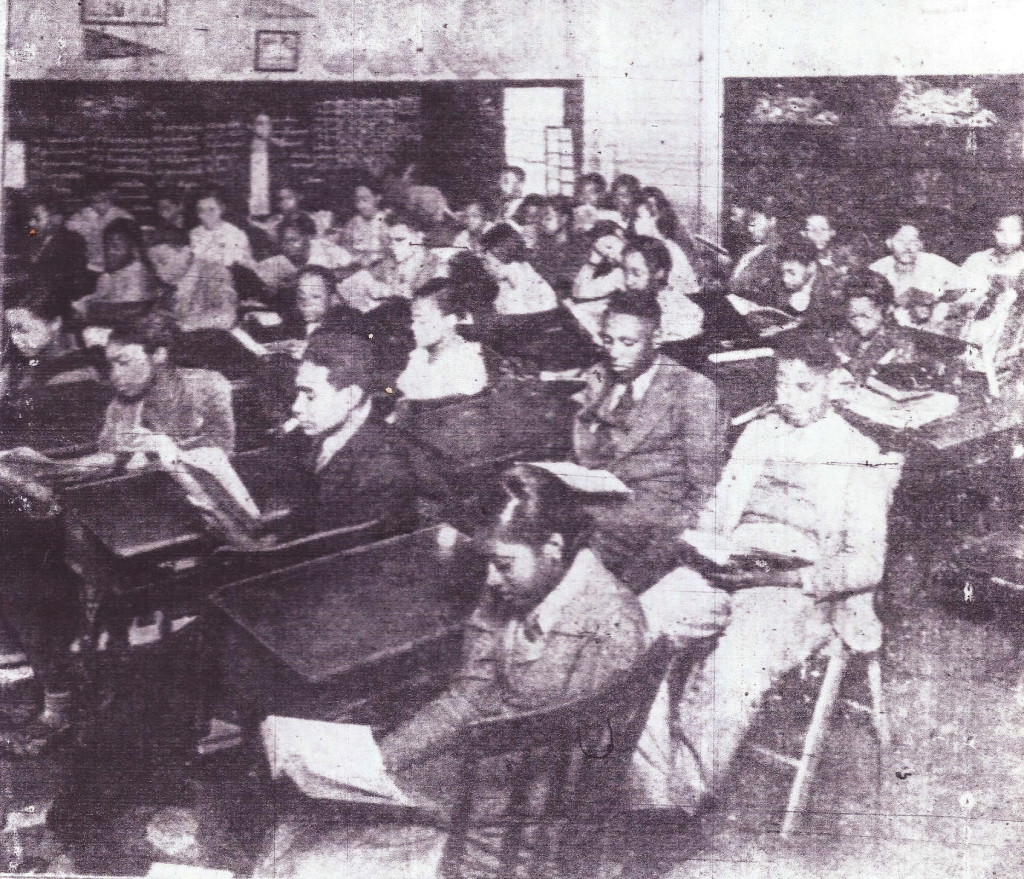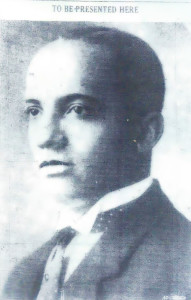John W. Hoffman students reading “Negro Makers of History”
As they prepared for the arrival of Dr. Carter G. Woodson, the students at John W. Hoffman Junior High School began reading and discussing Mr. Woodson’s book entitled, Negro Makers of History. All students were members of the New Orleans Junior Branch of the Association for the Study of Negro Life and History.
Arriving at the school on Friday, November 1934, Dr. Carter had just returned from Houston, Texas where he spoke to the annual convention of the National Association for the Study of Negro Life and History, an organization which he founded. Before heading back to his home, the highly respected writer and historian stopped over in New Orleans to address the student body and to speak to a large gathering that Sunday afternoon at the Pythian Temple where many were anxiously awaiting his arrival.
As expected, Dr. Woodson stressed to students the importance of learning their own history and taking pride in the contributions of their own people. He emphasized that African-American contributions were overlooked, ignored and even suppressed by the writers of history textbooks and by teachers who used them. The Negro, he said, has a glorious past, a great future and should be included in the building of a world culture of tomorrow. He pleaded for what he termed “intellectual lives” which he felt should be dedicated to the service of humanity and not to the materialism of the present.
As students reviewed his book, they discovered the various roles people of color played in such areas as exploration, trade, the American Revolution, slavery, religion, colonization, work force, and education.
Dr. Carter G. Woodson
In 1926, just eight years before his arrival at Hoffman, Dr. Woodson had launched Negro History Week. Fifty years later (1976) it would become known as Negro History Month. During this time, Dr. Woodson would mail thousands of bundles of free educational materials and programs to black newspapers and educators throughout the country. The packets came complete with suggested topics for classroom exercises. He stressed to teachers the importance of engaging students in active participation as opposed to rote memorization. He introduced students to the protest dramas of black playwrights that had begun in the 1920s and even encouraged educators to incorporate pageants and plays into the curriculum.
The young boys and girls of Hoffman School had the perfect role model standing before them that Friday in November of 1934. Young Carter was born 1875 in New Canton, Virginia; the 4th of seven children to enslaved parents, Anna and James Woodson. He worked as a sharecropper and in the mines to financially assist his family. He soon realized that the only way to escape poverty was through education.
Determination drove him to complete high school in two years rather than four, and to receive both a bachelor and master’s degree from the University of Chicago. His greatest educational achievement took place in 1912 upon receiving a doctorate from Harvard University. He would become only the second black from the prestigious institution to do so, following behind W.E.B. DuBois.
After completing his education, Dr. Woodson dedicated his life to the field of African- American History, working to make sure that the subject was taught in schools and studied by scholars. In his lifetime, he authored more than 30 books. His admirers called him a trailblazer and they dubbed him “The Father of Black History.”
Sources: The Southern Past: A Clash of Race and Memory (written by: William F. Brundage) pages 165-168; The Louisiana Weekly 17 November 1934+ 24 November 1934 + September 1934; www.afro.com/carter-g-woodson-a-man-beyond-his-time
Lolita Villavasso Cherrie





Great article. It could have been written yesterday. His observations give us reasons to stress a greater appreciation for our history and to demand its inclusion in the education of our young people
This is a great article and photo, as well as a great service to preserve all of our history. Thank you for posting it,
Ken Ducote,
As a retired teacher of the New Orleans Public School System, I am honored to receive such a compliment from someone of your stature. I am aware of your many years of service as an educator and urban planner for this system and the work you continue to do for the children of our city. Thank you.
This article enlightened me to the fact that Dr. Carter G. Woodson visited New Orleans which, I did not know. His works helped to create Black History Month. His book The Mis-Education of the Negro should be required reading by all Black American educators and all Blacks. It may be more beneficial than the three R’s – Reading, ‘Riting and ‘Rithmetic basic skills.. The cultural death of that book still applies today especially regarding Black American occupations. We must develop more than preachers, singers and athletes. Nice to have grown up in a city that named a school after Dr. C. G. Woodson. Great work Lolita!
Hi Ron,
Thank you for your continued interest in our articles on CreoleGen. Our history is so very rich with the contributions of both black males and females who excelled beyond the fields of athletics and music, especially those who did so through
education !
I’m a GRADUATE OF WOODSON Jr. High, 1969. I WENT ONTO SAINT AUG. BECAUSE OF WOODSON I AM THE MAN I AM TODAY—THANK GOD FOR THOSE DAYS !